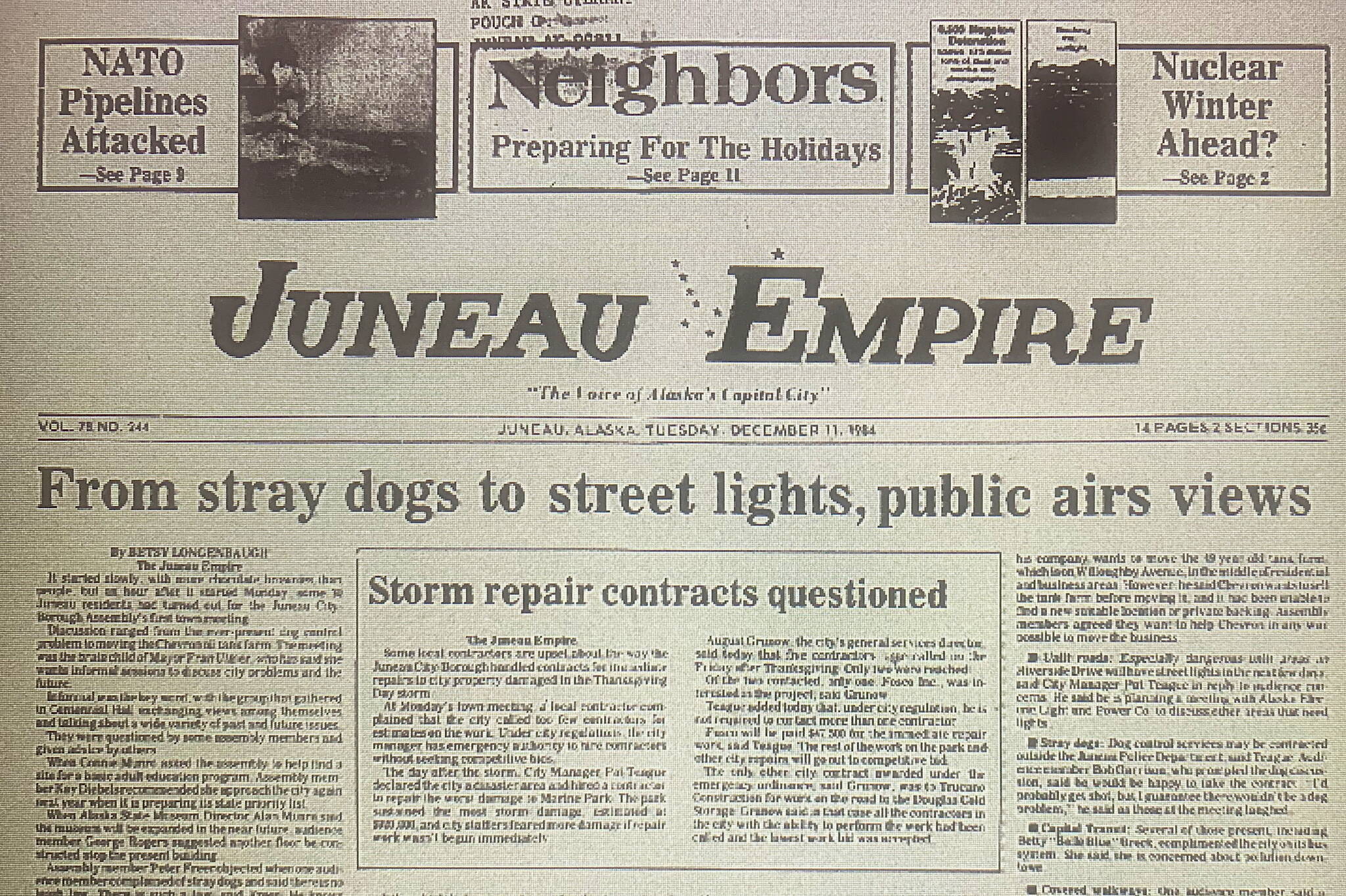Empire Archives is a series printed every Saturday featuring a short compilation of headline stories in the Juneau Empire from archived editions in 1984, 1994 and 2004. They include names, AP style and other content of their eras.
This week in 1984, it started slowly, with more chocolate brownies than people, but after an hour some 30 Juneau residents had turned out for the Juneau City-Borough Assembly’s first town meeting. Discussion ranged from the ever-present dog control problem to moving the Chevron oil tank farm. The meeting was the brainchild of Mayor Fran Ulmer, who had said she wants informal sessions to discuss city problems and the future. Among questions asked were about a site for an adult education program, if the Alaska State Museum will be expanded in the near future, and the feasibility of underground power cables and a performing arts center. There were also concerns expressed about unlit roads and a desire for covered walkways downtown.
Original Story: “From stray dogs to street lights, public airs views,” by Betsy Longenbaugh. 12/11/1984.
This week in 1994, about a month after voters turned down a capital move, efforts to make Juneau a better capital have focused mainly on the annual push to find housing for legislators and their staff. Beyond that, neither the Better Capitol Committee nor the Alaska Committee have specific plans on how to stave off another capital move attempt. In fact, the two groups are discussing whether they should continue with the same goal, combine or split in difference directions. With the election over, former Juneau Mayor Jamie Parsons said there is renewed optimism in the community and construction of new housing should increase.
Today providing sufficient housing for government workers remains a significant issue. While that includes people working at the Capitol, a major need has shifted into focus this year is residences for an estimated 190 U.S. Coast Guard personnel and about 400 family members projected to arrive within a few years with the upcoming homeporting of an icebreaker in Juneau.
Original Story: “Better capital efforts focus on housing needs,” by Jeanine Pohl. 12/12/1994.
This week in 2004, it was down to the wire Wednesday for voters requesting a recount in the Alaska U.S. Senate race. Organizers of the group Alaskans for Fair Elections spent Wednesday collecting the final contributions for the $10,000 necessary to conduct a state recount, according to Fairbanks organizer David Koester. Republican Sen. Lisa Murkowski defeated former Gov. Tony Knowles, a Democrat, by 9,568 votes. Official results show 307,371 citizens voted in the U.S. Senate race, with Murkowski winning 149,446 votes, Knowles winning 139,878 votes and the rest going to third-party candidates. At about 11 a.m. Wednesday, the group still needed between $500 and $1,000 by the state Division of Elections’ 5 p.m. deadline to request the recount. Organizer Joe Sonneman, of Juneau, said the group collected the final $1,000 throughout the day but faced another dilemma Wednesday afternoon. According to the group’s Web site, exit polls conducted at 3:30 p.m. on Election Day showed Knowles winning the election with 50 percent to Murkowski’s 47 percent. It also questions the accuracy of optical scan voting machines used in the election.
Today the Division of Elections website notes Murkowski prevailed over Knowles, 149,773 votes to 140,424, in a recount. Some of the issues raised then, especially about the validity of the machine counts, were again central to a recount completed this week for a ballot measure that sought to repeal ranked choice voting and open primaries in Alaska. The recount upheld the measure’s defeat.
Original Story: “Organizers request U.S. Senate recount,” by Timothy Inklebarger. 12/9/2004.
• Contact Mark Sabbatini at mark.sabbatini@juneauempire.com or (907) 957-2306.

